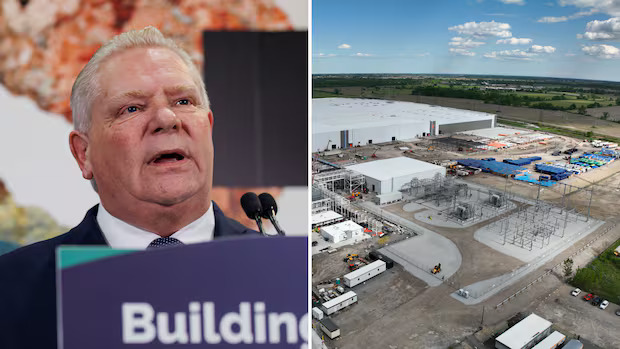Ontario premier says threat to nation’s auto industry is ‘very high’
Canada got “the best of a bad deal” when the country was spared yet another volley of tariffs from U.S. President Donald Trump’s administration Wednesday, Ontario Premier Doug Ford says.
But that deal is still “totally unacceptable,” Ford was quick to add when speaking with reporters at Queen’s Park Thursday, noting the threat to the nation’s auto sector especially is still “very high.”
“The only thing that’s acceptable is zero tariffs,” Ford said. “We’re going to continue targeting zero tariffs.
“I do believe [in], and I would support, retaliation tariffs, very similar to what they have against us in the auto sector, but that is strictly up to the prime minister.”
At a morning news conference, Prime Minister Mark Carney announced Canada is retaliating against Trump’s trade policy with a 25 per cent tariff on vehicles imported from the U.S. that are not compliant with the Canada-U.S.-Mexico Agreement (CUSMA).
The government will also impose the tariff on non-Canadian content of any CUSMA-compliant vehicles from the U.S., Carney said. Mexico won’t be impacted.
“Our tariffs will not affect auto parts because we know the benefits of our integrated production system,” he said, adding that the government is developing “a framework” for automakers to avoid counter-tariffs as long as they maintain production and investment in Canada.
Previous tariffs remain
While the White House says Canada and Mexico are not subject to Trump’s latest tariffs, they remain under previous economy-wide duties.
As well, 25 per cent duties on automobile imports into the U.S. come into effect Thursday.
Canada’s auto industry is bracing for impact from Trump’s tariffs that are set to come into effect Thursday. CBC’s Ali Chiasson breaks down how customers and dealers could be affected and what this could mean for those in the market for a new car.
Ford said while vehicles made in Canada will likely be hit with tariffs at a lower level, depending on the percentage of American parts in them, the threat to Ontario’s auto sector is still real.
“These auto companies aren’t making money hand over fist — they’re basically trying to get by day by day and keep their people employed,” Ford said.
But exactly how hard the auto sector will be hit depends on who you ask. David Paterson, Ontario’s representative in Washington, said on CBC Radio’s Metro Morning Thursday that Canada will have a net tariff of 12.5 per cent for vehicles, assuming that half of their content or parts came from the U.S.
Comparing that to a 25 per cent tariff for other nations, alongside a low Canadian dollar, “should give us a buffer and an ability” to be able to deal with this, Paterson said.
“Those that have been out calling for the imminent collapse of the auto sector this week I think are a little ahead of their ski tips,” he added.
Industry impacts already being felt
Flavio Volpe, president of the Automotive Parts Manufacturers’ Association, vehemently disagreed with that sentiment.
“I wouldn’t take any victory laps out of my little office in Washington, D.C., especially because these are real jobs for real people,” Volpe said on Metro Morning, firing back at Paterson about the impact on Ontario’s auto sector.
“In every kind of war — tariff war, trade war, real war — there’s always a bunch of people that are going to be the first to congratulate the enemy on mercy.”
Volpe argued that Canada has not heard that the country received at 12.5 per cent tariff for vehicles.
“What we heard was some language that hasn’t been formalized that we would get some credit for American content in vehicles,” he said, adding that a 12.5 per cent tariff would still eliminate profit margins for manufacturers.
Oshawa, Ont., is the heart of Canada’s auto sector and whether or not residents work in the industry, one thing is certain: They are keenly aware of the potential impact of the tariffs imposed by U.S. President Donald Trump. CBC’s Mike Crawley spoke to community members about their election concerns.
Impacts are already being felt in the industry. Stellantis announced this week that it is temporarily pausing production at its assembly plant in Windsor, Ont., for two weeks as it assesses the effects of the tariffs.
“That’s not normal. That’s not the way this business works,” Volpe said, noting that the plant’s suppliers will now have to shut down in turn.
“There’s no victory lap,” he said.
Ford says he is expecting the federal government will support affected workers, but he hopes the shutdown is only temporary.
“I’ve been saying this over and over again — a tariff on Canada attacks Americans,” Ford said.
American alcohol will remain pulled from shelves at the LCBO, the premier added.
Originally published on CBC


